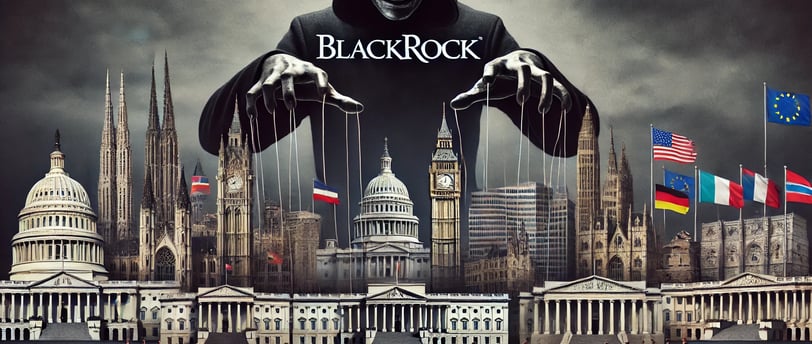The Hidden Agenda in Ukraine's Conflict
The Strategic Orchestration of Ukraine's Reconstruction Introduction to the Conflict and Corporate Interests The conflict in Ukraine, often discussed through the lenses of geopolitical rivalry and national sovereignty, harbors a less visible but profoundly significant dimension: the economic strategy aimed at reshaping the nation's future through corporate ownership. At the heart of this strategy is Blackrock, Inc., a giant in asset management with a vested interest in the outcomes of military and economic policies in conflict zones like Ukraine.
LB
11/14/20247 min read


The Strategic Orchestration of Ukraine's Reconstruction
Introduction to the Conflict and Corporate Interests
The conflict in Ukraine, often discussed through the lenses of geopolitical rivalry and national sovereignty, harbors a less visible but profoundly significant dimension: the economic strategy aimed at reshaping the nation's future through corporate ownership. At the heart of this strategy is Blackrock, Inc., a giant in asset management with a vested interest in the outcomes of military and economic policies in conflict zones like Ukraine.
NATO's Ambitions and Defense Contractors
The push by NATO to integrate Ukraine has been long-standing, driven significantly by the lobbying power of defense contractors. These corporations see in Ukraine not just a strategic ally but also a lucrative market for their products. The narrative that NATO's expansion was purely for security often overlooks the economic incentives, where every new member state becomes a potential buyer of defense hardware.
The insistence on Ukraine's NATO membership, despite the geopolitical tensions it provoked, can be seen as a strategic move to secure a market for Western defense products. This aligns with statements from figures like Mitch McConnell, who have implied that the aid and military support to Ukraine primarily benefits Western defense contractors rather than directly aiding Ukraine's defense efforts.
The Post-War Reconstruction Game Plan
The war, with its devastating effects on Ukraine's infrastructure, sets the stage for a massive reconstruction effort. This scenario is not just about rebuilding but represents a significant economic opportunity for those positioned to capitalize on it. Here, Blackrock emerges as a central figure:
Rebuilding Contracts: The U.S. government, under President Joe Biden's administration, has appointed Blackrock to manage the reconstruction of Ukraine. This decision places Blackrock in a position to influence not only how rebuilding occurs but also who benefits from the process.
Economic Conditions: The financial aid to Ukraine, often framed as loans or grants, comes with stringent conditions. Neo-conservatives have advocated for an austerity program which essentially forces Ukraine to privatize its assets. This economic strategy is reminiscent of past IMF interventions where financial aid is tied to economic liberalization, privatization, and the opening of markets to foreign investors.
Corporate Takeover: Agricultural Lands and Beyond
Ukraine is known for having some of the richest agricultural lands in the world, which have become a target for acquisition by multinational corporations:
Sale of Farmlands: Despite a supposed moratorium on land sales, significant portions of Ukraine's agricultural land have been sold or leased to companies like DuPont, Cargill, and Monsanto. These deals were often structured in ways to circumvent existing laws, pointing to a coordinated effort to secure control over Ukraine's agricultural sector.
Blackrock's Ownership: While direct ownership might not be fully transparent, Blackrock's influence in the agricultural sector is through its investments in these corporations. Blackrock, by managing vast sums of assets across various industries, including agriculture, indirectly controls significant swathes of Ukraine's economic potential.
Money Laundering and Financial Streams
The war has also opened avenues for financial misconduct:
Aid Misdirection: There's a growing concern that part of the aid meant for Ukraine could be siphoned off through shell companies or redirected through complex financial networks, eventually benefiting corporate entities rather than the Ukrainian populace or its military needs.
Defense Contracting Profits: The escalation of defense spending in the region, particularly through NATO allies, feeds into a cycle where defense contractors profit massively. These profits are then reinvested or used in ways that can obscure the financial trail, potentially facilitating money laundering.
Implications and Broader Context
Sovereignty and Economic Dependency: The conditions imposed by aid packages and corporate investments significantly undermine Ukraine's economic sovereignty. By tying reconstruction funds to asset sales and neo-liberal economic reforms, Ukraine's path to recovery is paved with dependency on foreign corporate interests.
Global Economic Strategy: This model of reconstruction through corporate takeover isn't isolated to Ukraine. It reflects a broader strategy where post-conflict zones are seen as opportunities for economic expansion by Western corporations, often under the guise of revitalization and aid.
The orchestration of Ukraine's conflict and subsequent reconstruction by entities like Blackrock, influenced by NATO expansion motives and neo-conservative economic policies, paints a complex picture of war not just as a geopolitical struggle but as an economic venture. The beneficiaries are clear, with defense contractors, agricultural giants, and asset managers like Blackrock positioned to gain from both conflict and its resolution. This scenario raises significant questions about the ethics of war, the manipulation of national crises for corporate gain, and the future of nations caught in such webs of international financial and military strategies.
Ukraine's journey post-conflict might not just be about rebuilding in the physical sense but about a profound transformation in ownership, governance, and economic structure, heavily skewed towards external corporate interests. This narrative, while controversial, underscores a critical aspect of modern warfare and economic policy where the line between state interests and corporate agendas blurs, often at the cost of the nation in question.
The Titans of Finance: Unveiling the Controllers and Major Stockholders of BlackRock
BlackRock, Inc., stands as a titan in the world of global finance, managing an astonishing $11.5 trillion in assets as of the end of 2023. As the world's largest asset manager, BlackRock wields significant influence over financial markets worldwide. However, the complexity of its ownership structure often leads to intrigue and speculation about who truly holds the reins of this financial behemoth. Here, we delve into the controllers and largest shareholders of BlackRock.
The Public Persona: Larry Fink
At the forefront of BlackRock's public image is its CEO and co-founder, Larry Fink. Known for his annual letters to CEOs which often set the tone for corporate governance discussions globally, Fink's influence in the financial sector is undeniable. However, the question arises: is Fink merely the face of a larger controlling entity?
Fink's Role
Larry Fink's role as CEO and Chairman positions him as a pivotal figure in BlackRock's decision-making process. His strategic vision has been instrumental in expanding BlackRock's reach, from its inception in 1988 as a small firm focused on risk management to becoming a global powerhouse. Yet, Fink's control is intertwined with broader ownership dynamics.
The Institutional Giants
Vanguard Group:
A significant revelation is the interlocking shareholdings among major asset managers. Vanguard Group emerges as one of the largest shareholders of BlackRock. This relationship exemplifies a common theme in the financial industry where large asset managers own stakes in each other, creating a complex web of mutual influence.
State Street Corporation:
State Street, another titan in asset management, also holds a considerable stake in BlackRock. This ownership structure suggests a scenario where BlackRock's decisions could be influenced by the strategic interests of these major institutional investors.
Bank of America:
Bank of America has been highlighted as owning a significant portion of BlackRock, illustrating how traditional banking giants also have a stake in these modern financial institutions. This connection not only merges traditional banking with investment management but also hints at a broader strategy where banks leverage asset managers for mutual benefit.
The Mutual Ownership Phenomenon
A notable trend discussed is the phenomenon of mutual ownership among BlackRock, Vanguard, and other large shareholders. This means that BlackRock itself holds shares in companies like Vanguard, creating a circular ownership that can complicate governance and decision-making.
Vanguard's Ownership in BlackRock: Vanguard's investment in BlackRock reflects a strategy where asset managers invest in competitors to diversify and perhaps exert influence subtly.
BlackRock’s Investment in Itself: BlackRock's practice of holding its own stock, either directly or through client funds, further muddles the ownership clarity. This could be seen as a strategy to maintain control or as a financial strategy to benefit from its own growth.
Critique and Conspiracy
The concentration of ownership in a few institutional hands has sparked debates and conspiracy theories:
Control or Influence?: While it's clear who the major shareholders are, the extent of their control over BlackRock's operations remains a subject of speculation. Some argue that Fink and the executive team might be mere figureheads for these larger entities.
Conspiracy Theories: There are narratives suggesting that BlackRock, along with other major asset managers, forms part of a shadowy network controlling global markets. These theories often lack empirical backing but highlight the public's fascination or concern with concentrated financial power.
Regulatory and Ethical Considerations
The ownership structure of BlackRock raises questions about:
Market Competition: With such interlinked ownership, the traditional dynamics of market competition could be skewed, potentially affecting consumer choice and market health.
Regulatory Oversight: The complexity of these ownership webs poses challenges for regulators in ensuring market fairness and transparency.
Ethical Investment: As BlackRock pushes for ESG (Environmental, Social, and Governance) investing, there's a discourse around whether these initiatives reflect genuine corporate values or strategic positioning by its major shareholders.
The Broader Implications
The structure where BlackRock's largest shareholders are themselves giants in the investment world has several implications:
Influence on Policy and Markets: These entities might steer BlackRock towards certain investment philosophies or corporate governance practices that align with their broader portfolio strategies.
Global Financial Stability: The interconnectedness can either stabilize or risk systemic issues, depending on how these relationships play out during economic turbulence.
Investor Perception: For everyday investors, this ownership structure might deter or encourage investment based on perceptions of control and stability.
Conclusion
BlackRock's ownership landscape reveals a tangled web where control is distributed among a few but influential entities. While Larry Fink personifies BlackRock's strategy and public face, the real power dynamics might be more diffused among Vanguard, State Street, and other significant stakeholders like Bank of America. This structure reflects not just financial strategies but also the evolving nature of global financial governance where power is less about singular control and more about a network of influential shareholders.
Understanding who controls BlackRock isn't just about pinpointing individuals or companies; it's about recognizing a system where control is shared, negotiated, and sometimes obscured by mutual investments. This intricate setup underscores the modern financial world's complexity, where the lines between competitor and collaborator blur, influencing not just market strategies but global economic policies.
-LB-
Other Articles You May Like:
What Could The Coming Department Of Government Efficiency Target To Cut?
How the Deep State Was Thwarted from Stealing the 2024 Election
"Kamala Harris: From Courtroom Crusader to Veep with a Side of Controversial California Politics"
The Intergalactic Guide to Earth's Political Shenanigans: Kamala Harris's Campaign Rhetoric Analyzed
Premium Web Hosting


